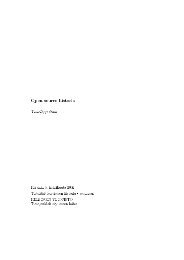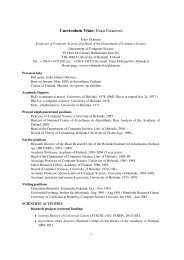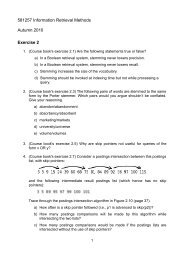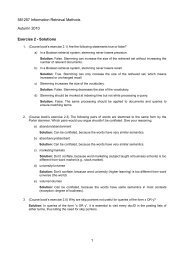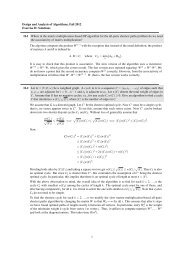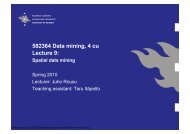Toni Sihvonen (order #92780) 62.142.248.1
Toni Sihvonen (order #92780) 62.142.248.1
Toni Sihvonen (order #92780) 62.142.248.1
You also want an ePaper? Increase the reach of your titles
YUMPU automatically turns print PDFs into web optimized ePapers that Google loves.
<strong>Toni</strong> <strong>Sihvonen</strong> (<strong>order</strong> <strong>#92780</strong>) 6<br />
in the kingdom. With the rewards come responsibilities:<br />
military service, counsel, and support with food, money<br />
and labor. [Glory Awards - One time Honors: page 1271<br />
The gerefa is an officer who administers, but does not<br />
own, some important part of the cyningdom: a burh, the<br />
villages of a farming valley, or a royal manor. Gerefas are<br />
generally thegns or ealdormen of proven character and<br />
responsibility. One important officer is the wigfruma<br />
(“war-leader,” field marshal), who is often the cyning’s<br />
younger brother or son. He can call up the fyrd (“militia”)<br />
to repel invasion.<br />
Thegns form the main military might of the Saxons. Each<br />
must own at least five hides: enough land to support a<br />
full-time warrior. A thegn should have armor, helmet,<br />
sword, shield, and several spears. He may know how to<br />
ride a horse, but he does his fighting on foot. A thegn’s<br />
household usually consists of his immediate family, house<br />
and farm servants, and possibly a heorthgeneat (“hearthcompanion,”<br />
a bodyguard) or two. The heorthgeneats<br />
may perform the duties normally assigned to Cymric<br />
squires in addition to guarding their thegn. Fegn’s<br />
Holding: page 130; Heorthgeneats as Squires: page 1301<br />
On the battlefield, the thegn is expected to fight in the<br />
front rank, along with his heorthwerod (unit of heorthgeneats)<br />
if he has one. Besides serving his lord in battle,<br />
the thegn may owe other duties: naval service, bodyguard<br />
for the cyning, fortifying a burh, or equipping a<br />
ship. Some later Saxon lords let their thegns pay the value<br />
of their duties in bord-bot or shield tax, a custom known<br />
to lazy Cymric knights as scutage.<br />
The lowest class of free Saxon is the ceorl, the farmer or<br />
craftsman. Most own a little land, but some are merely<br />
tenants of a thegn. In either case, most ceorls farm for<br />
their lord as well as themselves: others provide messenger,<br />
heorthgeneat, escort, or hunting services in lieu of<br />
farming. A few ceorls wander from place to place practicing<br />
a special talent, including professional scops (poets)<br />
and wryhtas (artisans), who make fine things for the<br />
nobility. Like all free Saxons, ceorls can conduct trade,<br />
and a few enrich themselves brokering goods between<br />
Britain and the continent.<br />
All ceorls belong to the *rd, the military levy of the<br />
theod, and must own at least a spear and shield. If a ceorl<br />
acquires five hides of land, or makes three trading voyages<br />
in his own ship, he is raised to the status of thegn.<br />
Below ceorls are the semifree laets. A laet is a Briton or<br />
other foreigner in Saxon-conquered territory who has surrendered<br />
to a theod, becoming a tributary dependent of<br />
its cyning. If the cyning agrees, the laet may be made a<br />
heorthgeneat, or may even be granted the land he held<br />
before the invasion. Most laets, though, rarely own more<br />
than a hide or two. Some Romano-British communities<br />
survived the Saxon invasions by adopting laet status en<br />
masse.



